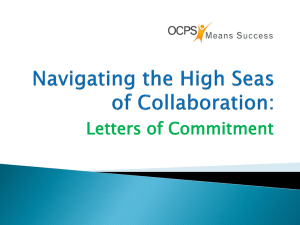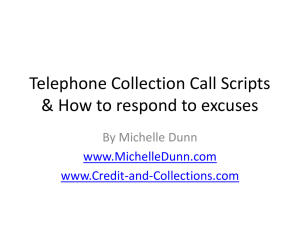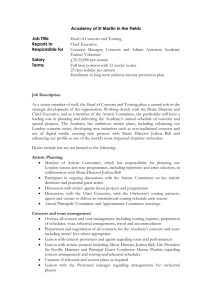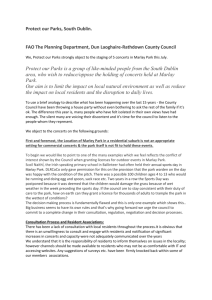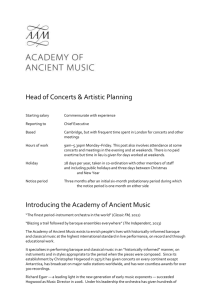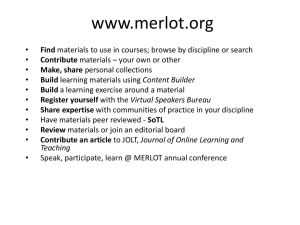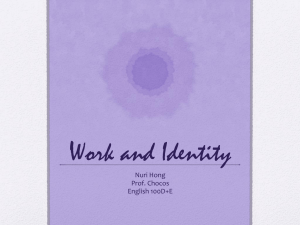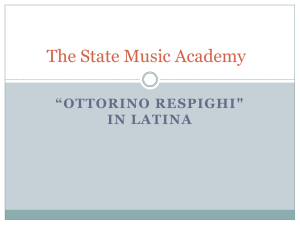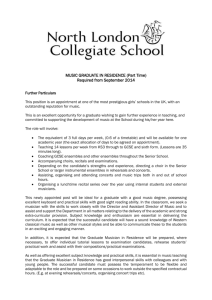No Excuses - Florida Music Education Associations
advertisement
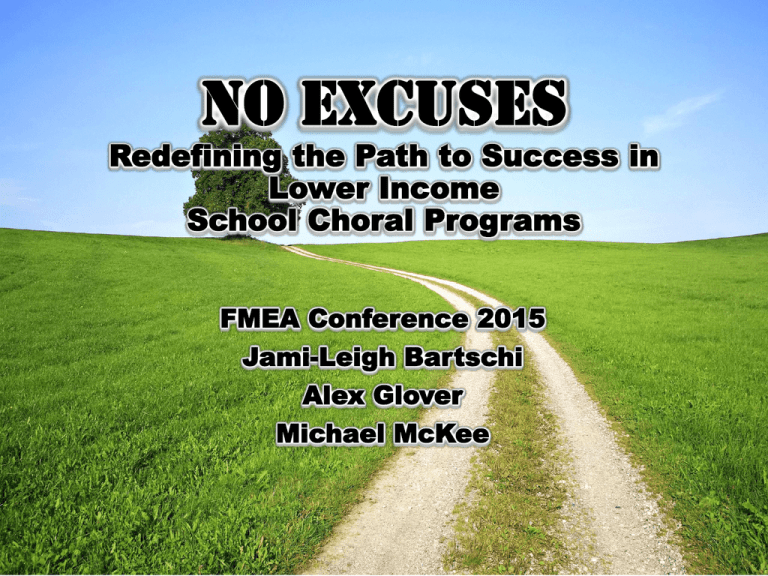
No Excuses Redefining the Path to Success in Lower Income School Choral Programs FMEA Conference 2015 Jami-Leigh Bartschi Alex Glover Michael McKee Put your cards on the table: What are YOUR excuses? • Students can’t pay fees • Fundraisers fail • No support at home • Student behavior • Audience behavior at concerts • Student transportation • Discipline • Respect • Personal baggage • Academic issues • Genres of music they’ve been exposed to • Not raised in a culture of classical music throw all those excuses out, and NEVER use them again. ever. Excuses are irrelevant • You’re a better teacher than that. • Your students are better students than that. • ALL STUDENTS ARE CAPABLE OF SUCCESS REGARDLESS OF THEIR BACKGROUND. YOU CAN’T BUY GOOD SINGING, AND YOU CAN’T BUY GOOD KIDS. Topics for discussion • Financial issues • Discipline & Respect • Culture of music in the home environment • Areas of success $ Money $ We never have any, and it’s hard to raise it. $ Money $ • Fees/donations/dues are difficult for lower income students to pay. • Questions to ask yourself: • How much money do you have on Day 1? • What do you want to do throughout the year? • What fundraising can you do to raise that money? • How much responsibility should fall to the kids? $ Money $ • Have great incentives for the students. • Make sure you’re not selling to the same people over and over again. • Don’t forget to advertise the product--THE SINGING!! Transportation “But i don’t have a ride!” transportation • Not only do most students, even in high school, not drive, but some of their parents don’t even drive. • Many parents are single parents with multiple jobs and other children to watch. • Required district performances • Bus limitations • HOWEVER…NOT HAVING A RIDE IS NEVER AN EXCUSED ABSENCE. EVER. transportation • Give students their rehearsal/performance calendar and handbook with expectations MONTHS in advance so they can plan. • Have them find a buddy in the choir that lives near them. • You sometimes need to provide buses. • TRAIN YOUR STUDENTS AND PARENTS TO MAKE TRANSPORTATION TO REHEARSALS AND PERFORMANCES A PRIORITY. Support from home you don’t have it. And neither do your students. Support from home • Neither students nor parents were raised in a culture of classical music. • Many students will be first generation high school graduates. • Society tells them that math, science, and reading are more important for them in finding a job. So who are we? Why do we matter? Support from home • YOU’RE NOT JUST TEACHING YOUR STUDENTS. YOU’RE TEACHING THEIR PARENTS. • Program concerts that are both academically valid and appealing to parents. • Communicate with parents relentlessly. • POSITIVE ATTITUDES ARE INFECTIOUS. START AN EPIDEMIC OF POSITIVE ATTITUDES ABOUT MUSIC EDUCATION. Discipline ugh… discipline • “Ahhhh!! How could they act this way?!” BECAUSE EVERY ADULT IN THEIR UNIVERSE ASSUMES THAT THEY WILL AMOUNT TO NOTHING. YOU HAVE TO BE DIFFERENT. discipline • Establish high expectations from Day 1. • Communicate with guidance counselors about not making your class a “dumping ground.” • Make contact with parents, and even invite them to attend class with their “little angel.” • Buddy system with a close colleague. • Document!!! Respect it’s there. You just have to know where to look. respect • Our students live in worlds where it is necessary for them to defend themselves. • When animals, including humans, feel the need to defend themselves, they become aggressive. RESPECT MUST BE MUTUAL. respect • Extend courtesies and signs of respect • ALWAYS use their name. • “I would never talk over you. I respect you too much.” • Know their interests and know them as individuals. • Attend their extracurricular events. • Treat them like adults. • Hold high expectations. Personal baggage it’s heavy. Help them carry it. Personal baggage • If you teach in a lower income school, you probably have students who are: • • • • Hungry Abused Abandoned Children of drug dealers, prisoners, gang members Use your imagination, and it’s probably a lot worse than that. Personal baggage • Their circumstances cannot define or excuse them…but you also can’t forget them. • You are sometimes the adult most invested in their lives. • Don’t waste an opportunity to connect with kids. • Open door policies • Know the boundaries—yours, theirs, and the school or district’s CONCERTS • How do we get the commitment? • Make arrangements for them to stay after school until the concert. • Provide transportation to off campus performances • Collaborate with colleagues and do joint concerts. • MAKE A BIG DEAL OUT OF THEM! THEY’RE THE STARS!!!!! CONCERTS • They won’t go on their own. SO TAKE THEM. • Get group deals • Make arrangements to take them to dress rehearsals • Take them to other schools’ concerts THEY DON’T KNOW WHAT THEY DON’T KNOW, AND THEY CAN NEITHER LIKE NOR DISLIKE WHAT THEY’VE NEVER HEARD TRAVELING • Many of our students have never: • Been on an airplane • Left Florida • Left their hometown • Consider trips and tours • • • • Where do you go? When do you go? What do you do? How do you do it? Genres of music to which they’ve Been exposed • Their knowledge of musical genres is limited. So even the playing field. • Teach them to analyze music objectively…regardless of genre. • Constantly remind them that good singing is good singing no matter what. • Use pop music to teach some concepts. Genres of music to which they’ve Been exposed • It doesn’t take long. It just takes consistency. • The key is analytical and objective thinking about music. • Keep your mind open and it will be easier to open theirs. Success it multiplies. Fast. Academic success • Stay informed about students’ academic success in other classes • Celebrate academic success • Strictly enforce GPA requirements • Support your core teachers…and they will be more likely to support you Classroom and concerts • ALL success is important and should be celebrated • Don’t wait for quantifiable success • Behavior • Application of musical concepts (tone, phrasing, dynamics, etc.) • Sight-reading • Music theory skills • Representation of the school at community events • You will notice they start raising their own bar MPA and other adjudicated events • What is success at MPA? • Form your own definition of success— don’t use someone else’s • Pick smart but challenging repertoire • Practice sight-reading in a way that closely resembles MPA • Practice EVERYTHING—audience etiquette, getting on and off stage, etc. • Establish an environment riddled with pride, enthusiasm, and focus, and there’s no way your students will be unsuccessful. YOUR STUDENTS CAN BE EVERY BIT AS SUCCESSFUL AS ANY OTHER STUDENTS. The path to get there may just look a little different. Questions? Jami-Leigh Bartschi Wekiva High School jami-leigh.bartschi@ocps.net Alex Glover Edgewater High School alexander.glover@ocps.net Mike McKee Lockhart Middle School michael.mckee@ocps.net
